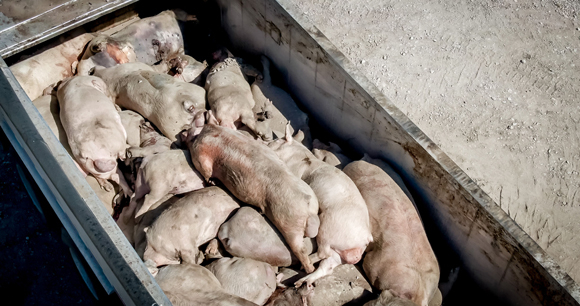
Washington, DC—As the COVID-19 pandemic drags on, the Animal Welfare Institute (AWI) is urging the American Veterinary Medical Association (AVMA) to revise its guidelines to no longer permit killing animals by inducing heat stroke, a method known as “ventilation shutdown plus.”
In a letter delivered earlier this month to the AVMA, the leading professional body representing veterinarians, AWI reiterated concerns expressed by the AVMA’s own membership that all forms of ventilation shutdown are likely to result in prolonged and severe suffering and should be reclassified as “not recommended” for depopulating animals.
The AVMA’s “depopulation” guidelines apply to the large-scale killing of farm animals in emergency situations, including for disease control purposes, such as in response to the highly pathogenic bird flu. The AVMA initially released its draft guidelines on depopulation in 2017, recommending a form of ventilation shutdown called “ventilation shutdown plus” (VSD+) in “constrained circumstances.” In VSD+, operators seal the barn, turn off the airflow, and add heat and sometimes steam to raise the temperature as high as 170 degrees. The process can take hours and cause extreme distress.
At the time, AWI warned that these guidelines might not prevent producers from using this extreme method in situations that instead call for humane euthanasia. In fact, that is exactly what happened during the COVID-19 pandemic, when the meat industry’s failure to protect workers from infection forced dozens of US slaughter plants to shut down temporarily. Facing financial losses and severe overcrowding of farm animals—who already endured cramped, filthy conditions—producers resorted to killing their animals.
Some producers spent an extended amount of time preparing for depopulation, which further demonstrates that this was not an emergency situation under the AVMA’s standards for depopulation. Although the USDA does not track the number of farm animals killed by various depopulation methods, VSD+ was used during the COVID-19 pandemic to kill at least a quarter of a million healthy pigs who posed no risk to public health.
“Veterinarians are sworn to protect animals, yet the AVMA is tolerating the most gruesome deaths imaginable,” said Dena Jones, farm animal program director for AWI. “Even the international authority on animal diseases, the World Organisation for Animal Health, doesn’t condone ventilation shutdown. Meat companies should not be rewarded with a quick fix due to their utter lack of emergency preparedness and failure to protect their workers.”
In January, more than 1,500 veterinarians petitioned the AVMA to classify all forms of ventilation shutdown as “not recommended.” The AVMA’s Panel on Animal Depopulation is currently reviewing the proposed changes. Though the AVMA guidelines are voluntary, the US Department of Agriculture typically relies on them to facilitate depopulation events for animal disease outbreaks.
Meanwhile, the USDA is providing payments to producers that depopulated chickens, turkeys, or pigs between March and December of 2020 due to insufficient slaughter access. The payments, which can exceed $1 million per producer, cover costs of killing the animals, regardless of the method used.
While the AVMA’s guidelines are touted as evidence-based, the veterinary organization has offered no scientific evidence to demonstrate that the use of any form of VSD in commercial agricultural settings meets its standards: 100% mortality for poultry and, for pigs, more than 95% of animals dead in less than one hour. In addition, no peer-reviewed research studies have examined the welfare impacts on animals.
Prominent animal scientist Temple Grandin has expressed her concern about the potential of VSD+ to cause animal suffering under field conditions, leading her to recommend against its use: “The high level of engineering expertise that would be required to correctly conduct this process is so great that it should not be used. Doing it wrong would cause great suffering.”*
In a recent email to AWI, Grandin referred to a study by veterinarian Angela Baysinger and others published in the Journal of the American Veterinary Medical Association, which found high mortality rates within 90 to 110 minutes after heat began to be added to a sealed pig barn, stating, “most farms would not have the engineering expertise to do the [Baysinger] heat and humidity procedure correctly. The use of a trailer-mounted electric stunner, similar to the systems in commercial slaughter plants, would be a better method.”
Rather than recommend VSD+ in certain situations, the AVMA could encourage efforts to produce, deploy, and use more humane depopulation methods. If the AVMA continues to permit VSD+ in “constrained circumstances,” supply chain disruptions should not qualify.
“In supporting ventilation shutdown, the AVMA is allowing the meat industry to continue to act irresponsibly by constructing massive buildings that confine tens and even hundreds of thousands of animals without consideration of how they will be protected in emergency situations,” Jones said. “Euthanasia literally means a ‘good death,’ yet these animals likely endure tremendous suffering while the USDA cuts a check to the meat industry, courtesy of American taxpayers.”
*Email statement to Direct Action Everywhere, Oct. 10, 2021.
Marjorie Fishman, Animal Welfare Institute
[email protected], (202) 446-2128
The Animal Welfare Institute (awionline.org) is a nonprofit charitable organization founded in 1951 and dedicated to reducing animal suffering caused by people. AWI engages policymakers, scientists, industry, and the public to achieve better treatment of animals everywhere—in the laboratory, on the farm, in commerce, at home, and in the wild. Follow us on Facebook, Twitter, and Instagram for updates and other important animal protection news.